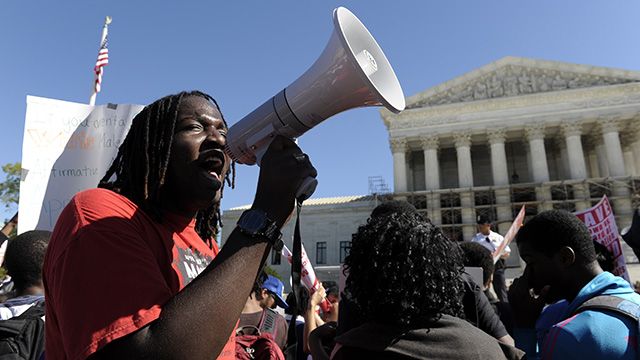
Last week, the Supreme Court put another nail in affirmative action’s coffin, but despite a blistering dissent, the truth is that the Schuette decision in itself is not especially egregious. After all, it’s not the final nail and what’s more, the underlying legal issues are convoluted, so much so that one liberal supporter of affirmative action was persuaded to vote against it.
Nevertheless, this case opens a window onto the court’s larger approach to equal justice, a vista that comes into focus when one compares the court’s rulings involving race versus sexual orientation. In race cases, the court almost always rejects discrimination claims brought by nonwhites while upholding challenges to affirmative action. But in sexual orientation decisions, the court has given gays and lesbians victory after victory, most recently by striking down the federal effort to narrowly define marriage.
It wasn’t always this way, of course. Indeed, up through the 1980s, the pattern was reversed: the Supreme Court actively intervened to protect nonwhites, but left sexual minorities exposed to discriminatory treatment.
What explains the change? Look to Justice Anthony Kennedy, appointed to the court in 1988. Playing the role of swing justice, Kennedy commonly joins his conservative colleagues in race cases. In contrast, Kennedy consistently sides with the liberal justices regarding sexual orientation. (Unlike reality, in the court’s jurisprudence, these categories — racial and sexual minorities — never overlap.)
But recognizing Kennedy’s special role only prompts a further question: what explains his divergent responses? Last week’s race case poses this question especially sharply, because it closely parallels a 1996 decision involving sexual minorities that came out differently — and Kennedy wrote both opinions.
In the earlier decision, Colorado voters had amended their state constitution to forbid local governments from banning sexual-orientation discrimination — as Aspen, Boulder and Denver had already done. In last week’s affirmative action case, Michigan voters had altered their state constitution to strip universities and colleges of the power to adopt race-sensitive admissions policies. In both cases, voters effectively changed the rules of the game: thenceforward, whereas other groups could continue to seek protection from local government directly, that avenue was cut off for sexual and racial minorities and they alone confronted the high mountain of amending the state constitution anew.
Despite this similarity, Kennedy offered opposite answers. He struck down the offending Colorado amendment, citing “the inevitable inference that the disadvantage imposed is born of animosity toward [homosexuals],” but upheld the Michigan amendment with a stern lecture on the need to trust voters in racial matters. So, again, why the difference?
It’s tempting to speculate that these decisions reflect the distinct dynamics of homophobia and racism. The argument would go something like this: perhaps because homophobia demonizes people who are members of our families, workplaces and churches, Kennedy is more likely to know and sympathize with sexual minorities; whereas racism generates geographic and socioeconomic distance and so Kennedy perhaps knows few racial minorities. While there may be something here, again, it’s speculative and also looks for answers in Kennedy’s private psyche rather than his public reasoning.
Examining the latter yields a related answer, though. Whether he actually knows racial minorities, in a striking way, Kennedy reasons as if it’s wrong — even borderline racist — to think about persons as nonwhites.
In the Michigan decision, Kennedy balked at determining whether minority interests were harmed, on the ground that this would require thinking about individuals as minorities: “if it were deemed necessary to probe how some races define their own interest in political matters, still another beginning point would be to define individuals according to race. But in a society in which those lines are becoming more blurred, the attempt to define race based categories . . . is inherently suspect and carries the danger of perpetuating the very racial divisions the polity seeks to transcend.”
Perhaps the best way to illustrate the flaw in this reasoning — particularly in terms Kennedy might appreciate — is to retrieve one of the most dramatic moments in the court’s sexual-orientation jurisprudence. Kennedy’s direct predecessor on the court was another swing justice, Lewis Powell. In 1986, when the court confronted a Georgia law criminalizing “sodomy,” Powell held the fifth vote. Unsure how to proceed, Powell explained to one of his clerks “I don’t believe I’ve ever met a homosexual”– even though, unbeknownst to him, the clerk he was addressing was gay. Powell ultimately cast the decisive vote — to uphold a law that punished and stigmatized same-sex sexual intimacy.
Seventeen years later, it was Kennedy who wrote the opinion overturning that case, castigating the decision for “demean[ing] the lives of homosexual persons.” In order to do so, obviously, Kennedy first had to perceive — in a way that Powell apparently could not — that sexual minorities were decent folks caught by social dynamics that reviled them.
This is the basic lesson, for Kennedy and for all of us: blindness toward group dynamics makes perceiving the demands of justice all but impossible. Kennedy advances or retards equality depending on whether he sees or shuts his eyes to the lived experiences of minorities.
Finally, there is a second basic lesson here as well, one connected to the remarkable sway of swing justices. The Constitution’s meaning changes with the court’s personnel and sometimes a single appointment can make all the difference.


